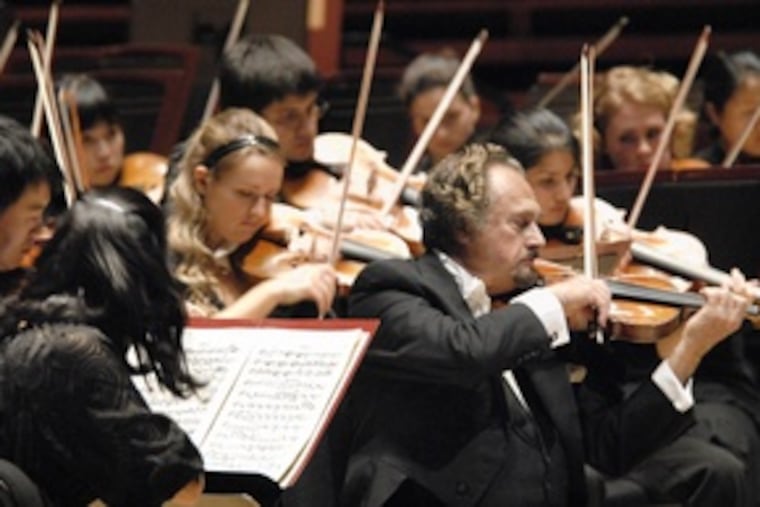Violinist Aaron Rosand, 92, longtime Curtis Institute of Music professor
He was one of the "truly great violinists and teachers of the 20th century."

Aaron Rosand, 92, a much-loved violinist long connected to the Curtis Institute of Music, died of kidney failure Tuesday evening, July 9, at White Plains (N.Y.) Hospital, his wife said.
In addition to his substantial performing career here and abroad, Mr. Rosand was noted for training major soloists, as well as players who now stock violin sections of ensembles around the world.
His Curtis affiliations spanned several roles. He was a 1948 graduate of the school and a professor there from 1981 until his retirement in May, when he was awarded an honorary doctorate.
He was one of the “truly great violinists and teachers of the 20th century,” said Curtis president Roberto Díaz in announcing his retirement.
He was also a major donor. In 2009, with his performing career behind him, Mr. Rosand sold his 1741 Guarneri del Gesù violin to a Russian billionaire for $10 million and donated $1.5 million to the music conservatory on Rittenhouse Square.
He was often cited as an old-school violinist with a wide repertoire and a style all his own.
“I turned on the radio recently, and there was a piece I hadn’t heard him play, and I heard literally two notes and thought, ‘Of course, that’s my teacher,’” said violinist Elissa Lee Koljonen, who studied with Rosand for nine years at Curtis. “The elegance, the romanticism, the clear, distinct violin playing, and bringing one’s personality into the playing. I don’t think there’s ever been another violinist quite like him.”
Born to a Russian mother and Polish father in Hammond, Ind., Mr. Rosand was a child prodigy growing up in Chicago. He went on to Curtis to study with Efrem Zimbalist, who had carried with him the traditions of famed violinist Leopold Auer from the St. Petersburg Conservatory.
His first recital came at age 9 and his debut with the Chicago Symphony Orchestra was a year later, according to a Curtis biography. His New York Philharmonic debut in 1960 with Leonard Bernstein was as soloist in that orchestra’s first performance of the Barber Violin Concerto.
He was widely admired for his warm, glowing sound, and obvious elegance.
“I can still remember his sound,” said violinist Ray Chen, who studied with Mr. Rosand at Curtis from 2005 to 2010. “By constantly demonstrating in our lessons, he really embedded his sound into his students, but at the same time he was always talking about how we must find our own unique voice. He didn’t want us to just become copies of him. He provided us with the foundation of sound and let us each develop on our own.”
Chen likened Mr. Rosand’s old-world philosophy to calligraphy, with the core sound sustained, “and of course the sound also changes constantly with emotion, but the integrity of the line continues and doesn’t release so easily. When it does release, it is a very intentional thing, and is shaped with care and a beautiful shape.”
For his part, Mr. Rosand defined one aspect of his old-school approach as the preservation of a work’s inner beat.
"The great tradition of romantic playing is that the tempo doesn’t vary. The rubato should never give a sense of distortion,” he told The Inquirer in 2000, referring to passing, subtle changes in the pace of the music for emphasis or emotion. “I don’t do anything that will throw the conductor or the orchestra.”
He had strong ideas as a teacher, but also bent his philosophies to the needs of particular students. He objected, for example, to the use of shoulder rests, structures that bridge the gap between the shoulder and the chin. But when long-necked violinist Stephen Waarts arrived as a student, Mr. Rosand allowed it.
Still, “a couple of times a year he would say, ‘Someday you’ll have to learn to play without this crutch,’” said Waarts.
“He always had a solution,” said Koljonen of his teaching.
His wife, Christina Khimm Rosand, said he had been seeing students up until about two weeks ago, giving them instruction from his wheelchair.
In addition to his wife, he is survived by stepdaughters Suzy Khimm Sarlin, Mia Khimm, and Deirdre Regina Shula, and three grandchildren.
A memorial tribute is planned for Saturday, July 27, with a tentative time of 4 p.m., at the Summit Music Festival at Manhattanville College in Purchase, N.Y., where Mr. Rosand was an artistic adviser.
Donations may be made to the festival at 270 Washington Ave., Pleasantville, N.Y. 10570.